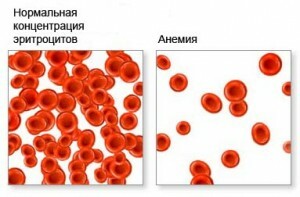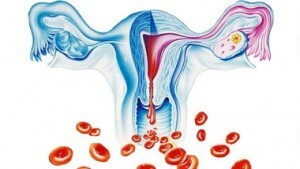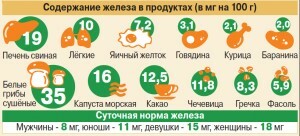The nature of menstruation largely depends on the general well-being and the existing diseases. But how critical days pass, can affect the health of women. And such a disease as anemia with menstruation can worsen in its manifestations, and also give menstruation other characteristics.
What is anemia

Anemia is a noticeable deficiency in the blood of hemoglobin, which supplies oxygen to the tissues. Lack of iron can form for various reasons, including systemic diseases, postoperative conditions, the inability of the gastrointestinal tract to absorb nutrients. In women, anemia is most often recorded because of the abundant periods. If she loses more than 50 ml of blood during menstruation for a day, she must endure it longer than 7 days and use a fresh pad more often than once every 3-4 hours, the onset of the disease is inevitable.
It has the following manifestations:
- Pale skin and mucous membranes;
- Weakness, reaching fainting, due to reduced pressure;
- A constant desire to go to sleep, even immediately after awakening;
- Deterioration of hair and nails;
- Decreased appetite and the appearance of unusual eating habits( the desire to eat chalk, earth).
Influence of anemia on the cycle
The regularity of the menstrual cycle is provided by a sufficient volume of hormones: follicle-stimulating, luteinizing, estrogen, progesterone. Their concentration varies at each stage. Deficiency of substances at any stage of the cycle leads to the fact that there will be a delay in menstruation, with anemia, this type of disorder occurs quite often. This is typical for those who suffer from the disease for a long time and do not make any efforts to combat it. As a result, the body is disrupted not only the work of the reproductive system, but also of the thyroid gland, the central nervous system. The body is so exhausted that, together with a diagnosis of "anemia", the absence of a period can be observed for several months.

In many cases, if the diagnosis of "anemia" disappeared monthly, it is caused by a deficiency of nutrients, and not the inability of the body to absorb them. This is familiar to girls who adhere to a rigid unbalanced diet, more precisely, the lack of meat in the diet, fish. Sharp weight loss always leads to severe hormonal disorders, which then are treated longer than they are purchased.
Features of menstruation in anemia

Anemia during menstruation can significantly complicate their course. PMS, all its signs, including painful sensations, intensifies. From the beginning of menstruation, weakness increases, appetite decreases, although in healthy women it increases at this time. A distinctive symptom characterized by anemia, observed with menstruation, is shortness of breath. She can pester a woman and in complete peace, grow with an increase in physical activity.
The nature of the discharge in anemia is determined by the characteristics of the blood composition. It reduces the number of red blood cells. In addition, the body lacks vitamins C and B, which weakens the blood vessels. It depends on what monthly for anemia. As a rule, they are intense, liquid in consistency, but with clots. The color of the discharge is bright red due to the presence of a large amount of blood. The menstruation lasts for more than 7 days, and its abundance does not decrease even at night.
Manifestations after critical days

Anemia after menstruation may increase symptoms. If before them the manifestations were not very strong, blood loss from menstruation will lead to
- Vertigo;
- Decline of strength and efficiency, inability to concentrate;
- Lack of appetite and the appearance of digestive disorders( bloating, constipation, eructation);
- Lumbling in the joints of hands, feet;
- Increased body temperature slightly above 37 degrees;
- Sensation of dryness of mucous membranes, which is especially strong in the vagina, as well as burning and itching of the perineum.
Treatment of
Severe anemia rarely occurs as an independent disease. More often this manifestation of a different ailment, which may be associated, among other things, with reproductive problems: myoma, endometriosis, ovarian dysfunction, even oncological diseases. Therefore, therapy should consist primarily of efforts and means aimed at getting rid of them. But special attention needs anemia with menstruation, treatment in this case should ensure a reduction in the abundance of secretions, and hence, blood loss.

It is also important to fill the hemoglobin deficiency, which increased during menstruation. The latter can be done by taking medications:
- Ferretab;
- Sorbifer;
- Totem;
- Fenules.
These are non-prescription drugs that help with a moderate degree of disease. They contain iron and substances that contribute to its assimilation. Treatment by them lasts not one month, the appointment makes sense on the basis of the analysis and the doctor's recommendation. Independent choice may be inaccurate if the drug is not suitable for a particular woman. Intramuscularly you can prick folic acid, vitamin B12 or Kombilipen. These are fortifying agents that also promote iron absorption and enhance immunity. 
To reduce blood loss are useful:
- Vikasol;
- Etamsylate;
- Dicinone;
- Diferelin;
- Traneksam.
All these drugs increase the viscosity of the biological fluid, as well as the density and elasticity of the vascular walls, thus preventing their destruction and splashing out of the blood. The abundance of secretions with them will return to normal, it is also possible to shorten the periods of critical days.
Therapy should be supplemented with a diet with high iron content( red meat, apples, pomegranates, beets, buckwheat, sea kale).Containing its products must be consumed separately from dairy, which interfere with the assimilation of the substance.
Anemia, which occurs during menstruation, may not immediately manifest obvious signs. But the excessive amount of excreta should not be left without attention. After all, with every cycle of blood loss, a decrease in hemoglobin increases, the problem is aggravated. Thus, the body signals about the existing malfunctions in it. In the end, you may need treatment in the hospital. Therefore, it is better to seek the help of a specialist at the first manifestations of a malaise.
Before using any medications, you should consult a physician specialist. There are contraindications.
